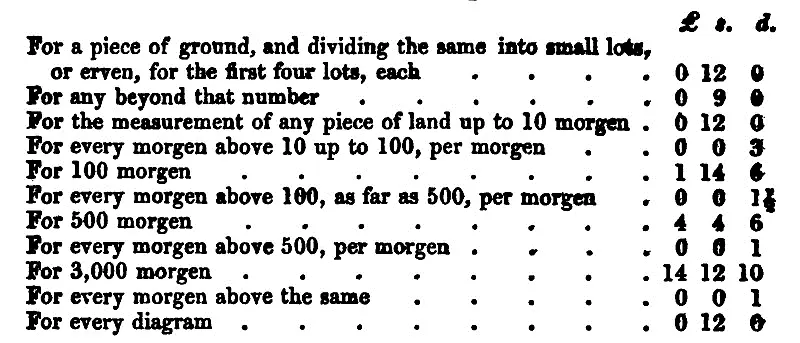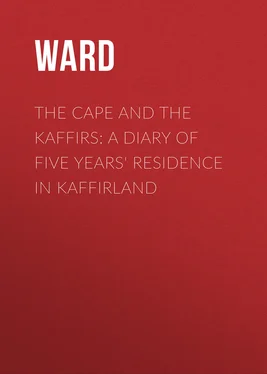Ward - The Cape and the Kaffirs - A Diary of Five Years' Residence in Kaffirland
Здесь есть возможность читать онлайн «Ward - The Cape and the Kaffirs - A Diary of Five Years' Residence in Kaffirland» — ознакомительный отрывок электронной книги совершенно бесплатно, а после прочтения отрывка купить полную версию. В некоторых случаях можно слушать аудио, скачать через торрент в формате fb2 и присутствует краткое содержание. Издательство: Иностранный паблик, Жанр: foreign_prose, История, foreign_edu, foreign_antique, на английском языке. Описание произведения, (предисловие) а так же отзывы посетителей доступны на портале библиотеки ЛибКат.
- Название:The Cape and the Kaffirs: A Diary of Five Years' Residence in Kaffirland
- Автор:
- Издательство:Иностранный паблик
- Жанр:
- Год:неизвестен
- ISBN:нет данных
- Рейтинг книги:4 / 5. Голосов: 1
-
Избранное:Добавить в избранное
- Отзывы:
-
Ваша оценка:
- 80
- 1
- 2
- 3
- 4
- 5
The Cape and the Kaffirs: A Diary of Five Years' Residence in Kaffirland: краткое содержание, описание и аннотация
Предлагаем к чтению аннотацию, описание, краткое содержание или предисловие (зависит от того, что написал сам автор книги «The Cape and the Kaffirs: A Diary of Five Years' Residence in Kaffirland»). Если вы не нашли необходимую информацию о книге — напишите в комментариях, мы постараемся отыскать её.
The Cape and the Kaffirs: A Diary of Five Years' Residence in Kaffirland — читать онлайн ознакомительный отрывок
Ниже представлен текст книги, разбитый по страницам. Система сохранения места последней прочитанной страницы, позволяет с удобством читать онлайн бесплатно книгу «The Cape and the Kaffirs: A Diary of Five Years' Residence in Kaffirland», без необходимости каждый раз заново искать на чём Вы остановились. Поставьте закладку, и сможете в любой момент перейти на страницу, на которой закончили чтение.
Интервал:
Закладка:
“Passengers themselves, however, or the Emigration Officers on their behalf, may recover, by a similar process, any sum of money made recoverable by the Act, to their own use, as return of passage-money, subsistence-money, or compensation; and, in such cases, the passengers are not to be deemed incompetent witnesses.—Sec. 53 and 56.
“The right of passengers to proceed at law for any breach of contract is not abridged by proceedings taken under this Act.—Sec. 37.”
For the use of the more opulent classes, the Commissioners have published the following summary of the terms upon which land may be purchased in Southern Africa.
“1. The unappropriated Crown lands at the Cape of Good Hope, and Natal, are sold in freehold, and by public auction only.
“2. Unless it is otherwise notified, the upset price will be at the Cape, two shillings per acre, (one acre is about half a morgen), and at Natal four shillings per acre, but the Governor, for the time being, will have the power to fix such higher upset price as the locality, or other circumstances, may render expedient, of which due notice will always be publicly given. Lands not sold at auction may afterwards be purchased at the upset price on payment of the whole purchase money.
“3. Persons desirous of becoming purchasers will apply, in writing, to the Secretary to Government respecting the land they wish to have put up for sale; stating in what division it is situated, and as far as practicable, its position, boundaries, and probable extent.
“These applications, after being recorded in the Colonial Office, will be transmitted to the Surveyor-General, who, if he sees no objection to the land being disposed of, will call upon the applicant to deposit with him the probable expense of the survey; which expense will be calculated upon the following tariff, and be borne by the eventual purchaser.

“4. Should the applicant not become the purchaser, the amount deposited by him will be refunded when paid by the eventual purchaser; but should no sale take place, no refund can be made.
“5. Lands offered for sale will be advertised for two months in the ‘Government Gazette,’ at the expiration of which time they will be sold by public auction.
“6. Ten per cent of the purchase money must be paid at the time of sale, and the balance, (with the expenses of the survey, if the purchaser did not make the deposit), within one calendar month from the day of sale: in default of which, the ten per cent so paid, will be forfeited to the Colonial Treasury.
“7. Persons desirous of acquiring Crown lands at the Cape of Natal, will be at liberty to make deposits at the Bank of England to the credit of the Colonial Land and Emigration Commissioners, upon the same conditions, and with the like privileges as are prescribed in the case of the Australian colonies 2 2 “Persons will be at liberty to make payments for colonial lands in this country, for which payment or deposit they will receive an order for credit to the same amount in any purchase of land they may effect in the colony, and will have the privilege of naming a proportionate number of emigrants for a free passage, as explained in the next article. The deposits must be made in one or more sums of 100 pounds each at the Bank of England, to the account of the Colonial Land and Emigration Commissioners; and the depositor must state at the time the colony in which the land is to be selected, and give notice to the Commissioners of the deposit. Upon production of the Bank’s receipt for the money, the Commissioners will furnish the depositor with a certificate, stating the amount which he has paid, and entitling him to obtain credit for that sum in any purchase which he may effect in the colony, subject to all rules and regulations in force in the colony at the time such purchase may be made. “For every sum of 100 pounds deposited as above, the depositor will be entitled, for six months from the date of payment, to name a number of properly qualified emigrants, equal to five adults, for a free passage. Two children between one and fourteen are to be reckoned as one adult. The emigrants are required to be chosen from the class of mechanics and handicraftsmen, agricultural labourers, or domestic servants, and must be going out with the intention to work for wages. They are to be subject to the approval of the Commissioners, and must, in all respects, fall within their general regulations on the selection of labourers. The purchaser and his family cannot receive a free passage under this privilege.”
, with this exception, that for every hundred pound so paid in, the depositor will be allowed to name for a free passage to the colony seven, instead of five properly qualified emigrants.
“Officers of the Army and Navy, whether on full or half pay, who may wish to settle at the Cape of Good Hope, are allowed a remission of the purchase money varying from 600 pounds to 200 pounds according to their rank and length of service.
“Military chaplains, commissariat officers, and officers of any of the civil departments of the army; pursers, chaplains, midshipmen, warrant officers of every description, and officers of any of the civil departments of the navy, are not allowed any privileges in respect of land. Although members of these classes may have been admitted formerly, and under different circumstances, they are now excluded. Mates in the royal navy rank with ensigns in the army, and mates of three years standing with lieutenants in the army, and are entitled respectively to corresponding privileges in the acquisition of lands.”
Chapter III.
History of the Cape Colony
The renowned promontory of the Cape was first doubled by the Portuguese navigator, Bartholomew Diaz, in the year 1487, but the discovery was not looked on as of any other importance than as opening the maritime route to India which that nation had so long sought after. Ten years later De Gama passed along the southern and eastern coast of Africa, and coming in sight of a fertile, pleasant country on Christmas day, he gave it the name of the Land of the Nativity, (Terra Natal) whence the appellation by which it is now known. In 1620, two of the officers of the English Merchant Adventurers landed in Saldanha Bay, and took formal possession of the country, in the name of James the First, but no European, settlement was attempted until the year 1650, when the Dutch India Company, at the recommendation of a surgeon of one of their ships, named Van Riebeck, placed a colony on the shore of Table Bay, further southward, for the purpose of affording supplies to their fleets.
Though the colony was at first composed, as was usual in those days, of persons of abandoned character, it grew and prospered, and in the course of about thirty years it received an accession of population of admirable character in the persons of French and German Protestant refugees, whom the atrocious proceedings of Louis the Fourteenth, in revoking the Edict of Nantes, and ravaging the Palatinate with fire and sword, had rendered homeless. These estimable exiles introduced the culture of the vine and other improvements, and the colony gradually spread itself along the belt of level land which extends itself eastward between the Lange Kloof and the sea.
About the same time Natal was visited by order of the Governor, and some idea was entertained of forming a settlement there, but, for some reason not now known, the project was abandoned.
The Dutch continued in peaceable possession of the colony for more than one hundred years longer, and had gradually spread themselves either as settlers or elephant hunters almost to the borders of the Orange River, when in 1795, a small English force, under General Craig and Sir Alured Clarke appeared, and the whole territory was at once surrendered. At the peace of Amiens, in 1802, it was restored to Holland; but in 1806 it again came into the hands of England, and was finally ceded to us in 1814. 3 3 The Boers, however, had little liking for this arrangement, which severed them from their parent country, and their hearts yearned towards a reunion with it. Of this I had a positive assurance before it was my fate to visit the colony myself. In the year 1838 I had the honour of making the acquaintance of H.R.H. Prince William Henry of Orange, who was on his voyage home in the “Bellona” frigate from Java, viâ Saint Helena. He dwelt with great pleasure on the circumstance of several Dutch families having travelled many miles from the interior to meet him at Cape Town, when he touched there. Aged men and women, who had scarcely moved out of their farm sitting-room for years, hastened to meet a Prince from their beloved Fatherland.
Интервал:
Закладка:
Похожие книги на «The Cape and the Kaffirs: A Diary of Five Years' Residence in Kaffirland»
Представляем Вашему вниманию похожие книги на «The Cape and the Kaffirs: A Diary of Five Years' Residence in Kaffirland» списком для выбора. Мы отобрали схожую по названию и смыслу литературу в надежде предоставить читателям больше вариантов отыскать новые, интересные, ещё непрочитанные произведения.
Обсуждение, отзывы о книге «The Cape and the Kaffirs: A Diary of Five Years' Residence in Kaffirland» и просто собственные мнения читателей. Оставьте ваши комментарии, напишите, что Вы думаете о произведении, его смысле или главных героях. Укажите что конкретно понравилось, а что нет, и почему Вы так считаете.












